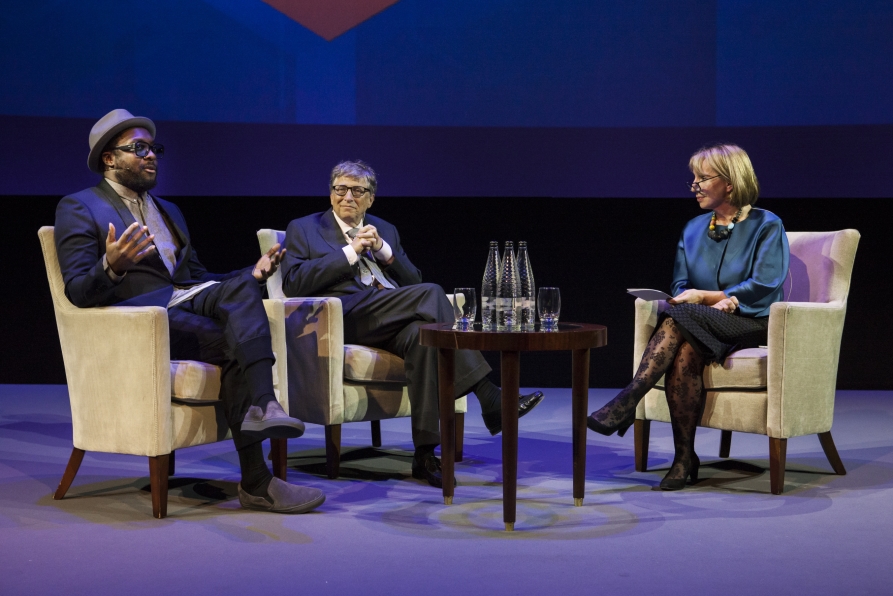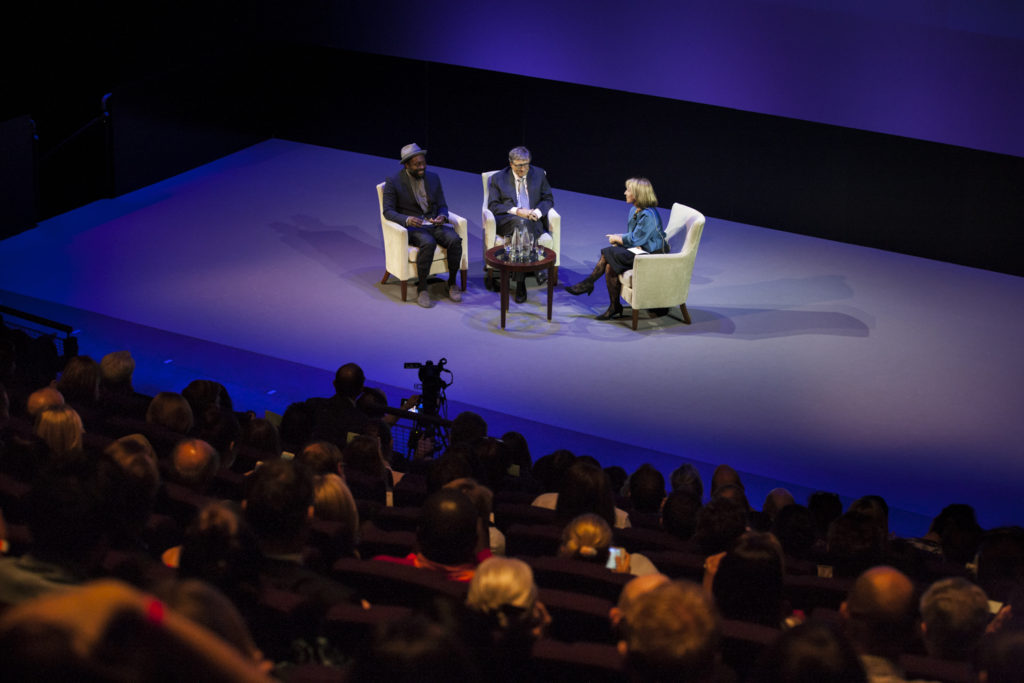Bill Gates and will.i.am discuss progress through innovation in science
The two philanthropists discussed their shared passion for science and STEAM (Science, Technology, Engineering, Art, Mathematics) skills as tools for developing innovative solutions.

From the London Science Museum Blog, written by Roger Highfield:
Philanthropist Bill Gates joined will.i.am, Grammy-award winning musician and advocate for education, to challenge governments to increase funding for research, development and education in the Science Museum yesterday.
Both ambassadors for science, technology, engineering and mathematics, who regard themselves as ‘global citizens’ too, they argued that by placing more emphasis on research nations can deal with inequalities, from those in health to education, and tackle discrimination.
The event – which was viewed 200,000 times in a Facebook Live broadcast – came at the culmination of a London visit by Gates in which he, Sir Richard Branson, and Secretary of State for International Development, Priti Patel, joined over 1,000 leading scientists to celebrate the $1 billion Grand Challenges programme of the Bill and Melinda Gates Foundation that seeks solutions to the most vexing problems in health and development.
Introduced by Science Museum director, Ian Blatchford, the Evening Standard Progress Conversation took place in front of a packed audience which included well-known figures such as Martha Lane Fox, Prof Jim Al-Khalili, Sir Harpal Kumar, Dame Mary Archer, politicians such as Amanda Solloway, MP, and Lord Willetts, and journalists, broadcasters and bloggers including Dallas Campbell, Ed Yong and GrrlScientist.
After an introduction by Helena Nordenstedt of the Karolinska Institute, Sweden, and statistics populariser Gapminder, in which she summed up global health in a single graph, Gates and will.i.am ranged over many subjects, from the extraordinary fertility of British science to the spectre of racist artificial intelligence, AI, in a Q and A with Evening Standard Editor, Sarah Sands.
It was fitting that, given the extraordinary diversity of the Museum’s vast collection of innovative firsts and its £24 million plans for Medicine Galleries, the most ambitious in the world, Gates praised Britain – singling out the Liverpool School of Tropical Medicine and London School of Hygiene and Tropical Medicine – for its “extraordinary leadership in science and innovation, which has been good for Britain and good for the world.”
 When glimpsing into the future, Gates said the impact of science and technology is accelerating. Of all the coming developments, he expected the most impact to come from AI which just in the last few weeks showed it was better able to understand human speech than people. Fifty years from now there will be less need for human labour, so working hours could be reduced.
When glimpsing into the future, Gates said the impact of science and technology is accelerating. Of all the coming developments, he expected the most impact to come from AI which just in the last few weeks showed it was better able to understand human speech than people. Fifty years from now there will be less need for human labour, so working hours could be reduced.
When gazing into his crystal ball, will.i.am predicted a new kind of poverty in the future, depending on how well artificial intelligence can curate information for a given person. ‘One day soon we will have our own personal AI” and depending on what AI they can afford, they will be information rich or information poor.
The education evangelist, who has worked with the Museum and the Prince’s Trust to reach out to disadvantaged children, said it was important to urge children to get into computer science, engineering or robotics.
He regards Bill Gates as a hero – a potential US President – and yearns for the day when children aspire to be scientists, engineers and innovators as much as singers. “Folks want to be like will.i.am in the inner city, not bill.i.am. We have to change popular culture, tech culture and politics to inspire these kids”.
Another reason is that racism is endemic, ‘in our system’ along with gender bias and could find its way into artificial intelligence without better education for all.
The Museum is working on a blockbuster Robots exhibition, which opens next February, and Gates said that he was optimistic future robots will help solve problems and will be subject to our control.
Despite more apocalyptic scenarios involving robot takeovers, he added that ‘it won’t be worse than nuclear weapons.’ He added the planet ‘will be fine…it is the human race that has to be careful.’
Afterwards Baroness Martha Lane Fox commented that for her the quote of the evening came from will.i.am, who said “the Internet can’t just be large companies, it has to be for everyone” which chimed with her Dimbleby lecture in the Science Museum.
A queue stretched down Exhibition Road and around the Natural History Museum for a Science Museum Lates, supported by the Bill & Melinda Gates Foundation, when over 150 researchers and scientists helped visitors discover more about infectious diseases and how we can protect ourselves from the threat of contagion.
In all, 4,500 visitors explored Lates, which featured a Malaria Zone to test how tasty their blood is for mosquitos and the chance to meet heroes who helped contain the recent Ebola epidemic.
Also yesterday, in partnership with the British Science Association, Bill Gates launched a Youth Grand Challenge programme for school children aimed at inspiring the next generation of great British scientists and innovators.
Roger Highfield is Director of External Affairs at the Science Museum. Images courtesy of the London Science Museum.